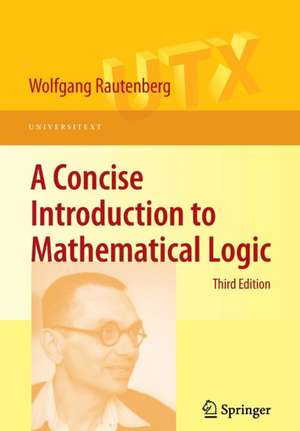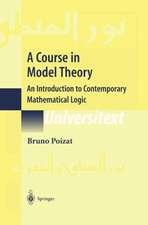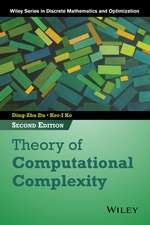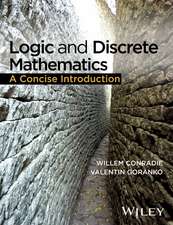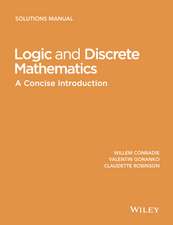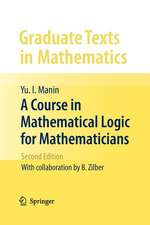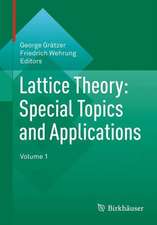A Concise Introduction to Mathematical Logic: Universitext
Autor Wolfgang Rautenbergen Limba Engleză Paperback – 17 dec 2009
Din seria Universitext
- 13%
 Preț: 353.48 lei
Preț: 353.48 lei -
 Preț: 418.67 lei
Preț: 418.67 lei -
 Preț: 465.61 lei
Preț: 465.61 lei -
 Preț: 371.98 lei
Preț: 371.98 lei - 17%
 Preț: 394.41 lei
Preț: 394.41 lei -
 Preț: 356.77 lei
Preț: 356.77 lei - 17%
 Preț: 364.56 lei
Preț: 364.56 lei - 15%
 Preț: 543.75 lei
Preț: 543.75 lei - 15%
 Preț: 497.21 lei
Preț: 497.21 lei -
 Preț: 634.38 lei
Preț: 634.38 lei -
 Preț: 396.53 lei
Preț: 396.53 lei - 17%
 Preț: 427.68 lei
Preț: 427.68 lei - 13%
 Preț: 355.51 lei
Preț: 355.51 lei -
 Preț: 360.07 lei
Preț: 360.07 lei - 17%
 Preț: 365.34 lei
Preț: 365.34 lei -
 Preț: 358.44 lei
Preț: 358.44 lei - 15%
 Preț: 553.33 lei
Preț: 553.33 lei - 17%
 Preț: 364.81 lei
Preț: 364.81 lei -
 Preț: 673.45 lei
Preț: 673.45 lei - 15%
 Preț: 509.58 lei
Preț: 509.58 lei - 17%
 Preț: 427.32 lei
Preț: 427.32 lei - 17%
 Preț: 426.76 lei
Preț: 426.76 lei - 8%
 Preț: 495.43 lei
Preț: 495.43 lei - 20%
 Preț: 569.54 lei
Preț: 569.54 lei - 19%
 Preț: 429.21 lei
Preț: 429.21 lei - 17%
 Preț: 369.06 lei
Preț: 369.06 lei - 15%
 Preț: 737.46 lei
Preț: 737.46 lei - 13%
 Preț: 389.95 lei
Preț: 389.95 lei -
 Preț: 487.96 lei
Preț: 487.96 lei - 20%
 Preț: 628.22 lei
Preț: 628.22 lei -
 Preț: 372.86 lei
Preț: 372.86 lei -
 Preț: 319.07 lei
Preț: 319.07 lei -
 Preț: 379.86 lei
Preț: 379.86 lei -
 Preț: 445.88 lei
Preț: 445.88 lei -
 Preț: 382.36 lei
Preț: 382.36 lei - 15%
 Preț: 533.72 lei
Preț: 533.72 lei - 15%
 Preț: 496.02 lei
Preț: 496.02 lei - 15%
 Preț: 474.82 lei
Preț: 474.82 lei -
 Preț: 389.70 lei
Preț: 389.70 lei -
 Preț: 484.08 lei
Preț: 484.08 lei - 15%
 Preț: 469.41 lei
Preț: 469.41 lei - 15%
 Preț: 643.48 lei
Preț: 643.48 lei -
 Preț: 415.02 lei
Preț: 415.02 lei - 15%
 Preț: 602.25 lei
Preț: 602.25 lei - 20%
 Preț: 510.24 lei
Preț: 510.24 lei - 15%
 Preț: 588.37 lei
Preț: 588.37 lei -
 Preț: 381.59 lei
Preț: 381.59 lei -
 Preț: 489.87 lei
Preț: 489.87 lei -
 Preț: 493.89 lei
Preț: 493.89 lei
Preț: 504.67 lei
Preț vechi: 593.73 lei
-15% Nou
Puncte Express: 757
Preț estimativ în valută:
96.57€ • 101.10$ • 79.90£
96.57€ • 101.10$ • 79.90£
Carte tipărită la comandă
Livrare economică 05-19 aprilie
Preluare comenzi: 021 569.72.76
Specificații
ISBN-13: 9781441912206
ISBN-10: 1441912207
Pagini: 340
Ilustrații: XXII, 320 p. 25 illus.
Dimensiuni: 170 x 242 x 18 mm
Greutate: 0.57 kg
Ediția:3rd ed. 2010
Editura: Springer
Colecția Springer
Seria Universitext
Locul publicării:New York, NY, United States
ISBN-10: 1441912207
Pagini: 340
Ilustrații: XXII, 320 p. 25 illus.
Dimensiuni: 170 x 242 x 18 mm
Greutate: 0.57 kg
Ediția:3rd ed. 2010
Editura: Springer
Colecția Springer
Seria Universitext
Locul publicării:New York, NY, United States
Public țintă
GraduateCuprins
Propositional Logic.- First-Order Logic.- Complete logical Calculi.- Foundations of Logic Programming.- Elements of Model Theory.- Incompleteness and Undecidability.- On the Theory of Self-Reference.
Recenzii
From the reviews of the third edition:
“Wolfgang Rautenberg’s A Concise Introduction to Mathematical Logic is a pretty ambitious undertaking, seeing that at the indicated introductory level it covers ‘classical material … and Godel’s incompleteness theorems, as well as some topics motivated by applications, such as chapter on logic programming’ (from the Foreword by Lev Beklemishev). … The third edition … is a fine piece of scholarship and will more than repay the efforts of the committed student who chooses this means as an entry into modern mathematical logic.” (Michael Berg, The Mathematical Association of America, June, 2010)
“This is essentially the English translation of the third edition of the German version [Einführung in die mathematische Logik. Ein Lehrbuch. Wiesbaden: Vieweg+Teubner (2008; Zb1 1152.03-002)] of this well-written textbook … . The book remains one of the most recommendable introductions into mathematical logic for mathematicians, and well-suited for computer scientists too.” (Siegfried J. Gottwald, Zentralblatt MATH, Vol. 1185, 2010)
“Wolfgang Rautenberg’s A Concise Introduction to Mathematical Logic is a pretty ambitious undertaking, seeing that at the indicated introductory level it covers ‘classical material … and Godel’s incompleteness theorems, as well as some topics motivated by applications, such as chapter on logic programming’ (from the Foreword by Lev Beklemishev). … The third edition … is a fine piece of scholarship and will more than repay the efforts of the committed student who chooses this means as an entry into modern mathematical logic.” (Michael Berg, The Mathematical Association of America, June, 2010)
“This is essentially the English translation of the third edition of the German version [Einführung in die mathematische Logik. Ein Lehrbuch. Wiesbaden: Vieweg+Teubner (2008; Zb1 1152.03-002)] of this well-written textbook … . The book remains one of the most recommendable introductions into mathematical logic for mathematicians, and well-suited for computer scientists too.” (Siegfried J. Gottwald, Zentralblatt MATH, Vol. 1185, 2010)
Textul de pe ultima copertă
Traditional logic as a part of philosophy is one of the oldest scientific disciplines and can be traced back to the Stoics and to Aristotle. Mathematical logic, however, is a relatively young discipline and arose from the endeavors of Peano, Frege, and others to create a logistic foundation for mathematics. It steadily developed during the twentieth century into a broad discipline with several sub-areas and numerous applications in mathematics, informatics, linguistics and philosophy.
This book treats the most important material in a concise and streamlined fashion. The third edition is a thorough and expanded revision of the former. Although the book is intended for use as a graduate text, the first three chapters can easily be read by undergraduates interested in mathematical logic. These initial chapters cover the material for an introductory course on mathematical logic, combined with applications of formalization techniques to set theory. Chapter 3 is partly of descriptive nature, providing a view towards algorithmic decision problems, automated theorem proving, non-standard models including non-standard analysis, and related topics.
The remaining chapters contain basic material on logic programming for logicians and computer scientists, model theory, recursion theory, Gödel’s Incompleteness Theorems, and applications of mathematical logic. Philosophical and foundational problems of mathematics are discussed throughout the text. Each section of the seven chapters ends with exercises some of which of importance for the text itself. There are hints to most of the exercises in a separate file Solution Hints to the Exercises which is not part of the book but is available from the author’s website.
This book treats the most important material in a concise and streamlined fashion. The third edition is a thorough and expanded revision of the former. Although the book is intended for use as a graduate text, the first three chapters can easily be read by undergraduates interested in mathematical logic. These initial chapters cover the material for an introductory course on mathematical logic, combined with applications of formalization techniques to set theory. Chapter 3 is partly of descriptive nature, providing a view towards algorithmic decision problems, automated theorem proving, non-standard models including non-standard analysis, and related topics.
The remaining chapters contain basic material on logic programming for logicians and computer scientists, model theory, recursion theory, Gödel’s Incompleteness Theorems, and applications of mathematical logic. Philosophical and foundational problems of mathematics are discussed throughout the text. Each section of the seven chapters ends with exercises some of which of importance for the text itself. There are hints to most of the exercises in a separate file Solution Hints to the Exercises which is not part of the book but is available from the author’s website.
Caracteristici
Chapter summaries Section summaries Detailed illustrations Study guides at the ends of sections Exercises at the ends of chapters or sections Solutions to selected exercises in the book A separate solutions manual (on the Internet) Instructor's manual with solutions and teaching guides Includes supplementary material: sn.pub/extras
